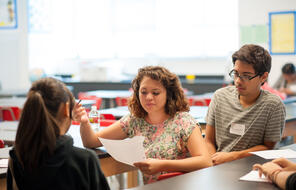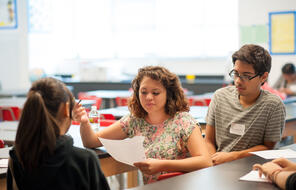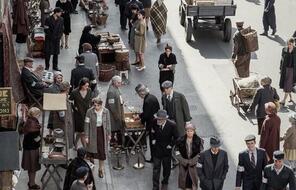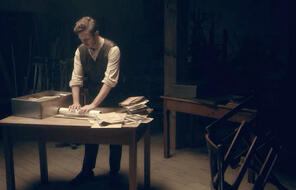Breadcrumb
This resource is part of:
Nuremberg Remembered
At a Glance
Language
English — USSubject
- History
- The Holocaust
Nuremberg Remembered

This is a Christmas card from Nuremberg from me in 1945. I don't know that you can see it, if you'll hold it a minute, I will try and find myself on there. I'm right here. Just happened to get me. Nuremberg stands both for a place and a trial. I arrived for the first time in Nuremberg in a small military two engine plane. And the pilots circled the city and as we looked straight down, we saw nothing but ruins. And so Nuremberg seemed to be a particularly appropriate place, since the Nazis had held their big rallies there and it got the worldwide publicity to demonstrate where these paths of glory led. To be there as a witness, when the living leaders of the Nazi government are being brought to justice is the single most important event in my life. We were trying people and we were trying to dispense justice. And we were trying to stand for what was good and what was right and what was true. There were two kinds of trials that are called the Nuremberg Trials. The first one was an international military tribunal, in which there were French, Russian, British, and American judges, and it was a very expensive and enormously complicated thing to mount. The second set of trials was to be mounted by each country in its zone of occupation of Germany. I thought the most interesting one, for me, would be the industrialists' case, because they had the choice of either going along with Hitler or not going along with Hitler or redirecting him, because they had the powerful industrial machine to frustrate his plans or enable them. I arrived in Nuremberg on one of the first days, when the International War Crimes trial opened in Nuremberg. I had read about it, I knew it was taking place, and I was very excited about it. To be there, as a 20-year-old kid who had never written, had no job, had no education, and there I'm sitting with the cream of the international press, reporting from the events of the trial. Nürenberger Prozeß the Nuremberg Trial. A former Buchenwald inmate as special correspondent in Nuremberg. I have to tell you, I'm Jewish. My family had lived in Germany for over 300 years. 1939, World War II broke out. The Nazis invaded Poland September 1, 1939. Three days later, September 3rd, there's a knock on the door, there was a Gestapo man. Ernst Michel? I said yes. Six o'clock tomorrow morning at the train station. Uh? No question. 6 o'clock, no questions. And now I am sitting in Nuremberg. Now, it is incongruous and the words fail me till today to explain to you how I felt having spent 5 and a half years in the concentration camps and here I am, as a survivor. Not only as a survivor, by as a reporter. Once in a while, I wanted to jump down and to grab them. There was Göring, smiling. Why did you do that? What had I done? I was born as a Jew, lived in Germany for-- my family-- for I don't know for how long. But I couldn't do it. I had to report. You asked me what are the purposes of a trial. The question should perhaps be reversed. Is there any purpose served by allowing a murderer to walk free? And Justice Jackson put it very well. He said, what is at stake here is the existence of humanity itself because the Nazis set out to destroy all groups with which they didn't agree, racially or politically. If they were allowed to do that, and not have us react by saying that's a terrible thing, we will not tolerate it, and to support the rule of law, we would have had nothing but chaos and anarchy throughout the world. Now, imagine the world if we could prevent war, the supreme international crime. There is no such thing as a war without atrocities. Every war has atrocities. I was a war crimes investigator. I can swear to you, you'll never have a war without atrocities. So imagine a world in which crimes against humanity and war-making itself could be eliminated. What a wonderful, different world that would be. And that's what Nuremberg was trying to accomplish, to begin moving in that direction. No time in history-- let me emphasize that-- was ever a situation where the leaders of a Western civilized government, or any government, were brought to trial for crimes against humanity and killing innocent people. Never happened before. What was special about Nuremberg? Four great powers agreed there should be a trial. Four great powers resolved their differences and agreed on the law to govern that trial. It was not a question of whether the victors would hold the defendants accountable. The question was whether you were going to do as the British urged, take 25 or 100 important Nazi leaders and call in the firing squad, or whether you were going to give them at least a chance to defend themselves. There were many people in the military who disapproved of the trials, and as indeed there were in the United States. The opposition to the trials continued afterwards for decades. And people would say to me, you were at the trials? Aren't you ashamed? I mean, this was not exactly the thing for which you would be pinned with some sort of wonderful medal. The idea of holding individuals in the government responsible for what the government did was unheard of before the trials and the argument was, this is retroactive justice. You cannot do this to people. You cannot prosecute them for something that wasn't the law before they started. Perhaps the most important person who opposed the trials was Churchill himself. Because, before the trials took place, he said we ought to take those guys out and just shoot them. What he said at the end of it all was, I was wrong. Was everything perfect at Nuremberg? I don't believe so. But under the circumstances, it was the best way of doing it and, hopefully, it'll be the beginning of future instances like that, where the leaders of a government-- and we know who they are-- are eventually being brought to trial for crimes against humanity. That was the lesson of Nuremberg and this is why I just feel so good, 60 years afterwards, to be able to talk about it. For many weary months, a mountain of incredible proof has piled up against these men. Millions of words of evidence have been heard by the judges, thousands upon thousands of documents have been examined by the finest legal minds of the four nations. For five savage and bloody years, humanity has waited for this moment of retribution, when the insane ambitions of men like these would come up against the stone wall of world justice. I think it is important to remember Nuremberg because, among the crimes not included in the indictment in Nuremberg is the crime of silence as atrocities occur throughout the world and as we turn a blind eye. There are crimes committed by government leaders all over the world and I welcome the idea of an international court, like it was at Nuremberg, to bring these people to justice. We were dreaming of a better world and that world meant continuing what we tried to do at Nuremberg. If we can stop aggression, if we can stop war-making That is the supreme international crime. That is the biggest atrocity of all. To me, Nuremberg is a history of a period that I hope won't repeat but I have to say, just knowing history doesn't guarantee that it won't repeat.
Nuremberg Remembered
You might also be interested in…
Americans and the Holocaust: The Refugee Crisis

Teaching the Holocaust and Armenian Genocide: For California Educators

Introducing and Dissecting the Writing Prompt

Introducing Evidence Logs

Telling Our Histories

Adding to Evidence Logs, 1 of 4

Adding to Evidence Logs, 2 of 4

Adding to Evidence Logs, 3 of 4

Watching Who Will Write Our History

Adding to Evidence Logs, 4 of 4

Refining the Thesis and Finalizing Evidence Logs

Teaching Who Will Write Our History


